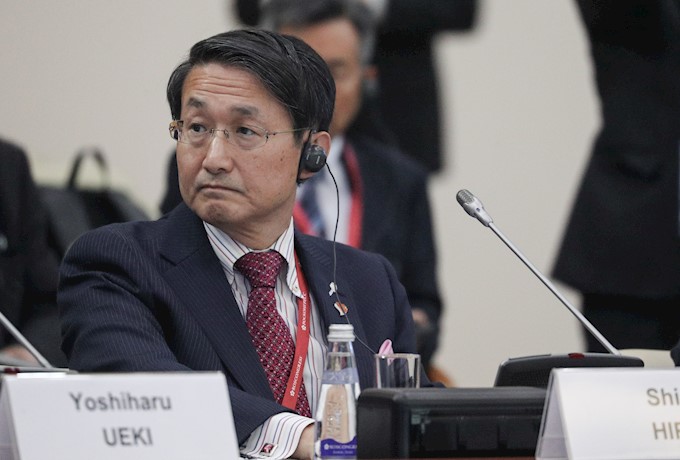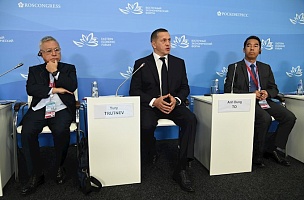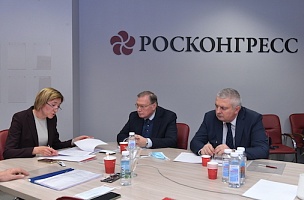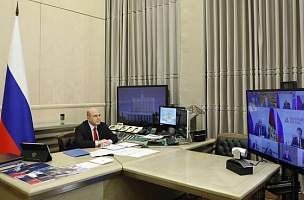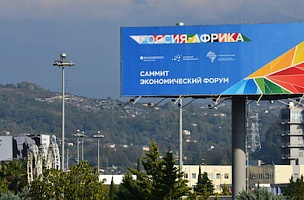KEY CONCLUSIONS
Russian market
attracts Japanese investors
“The Russian Far East, as the gateway that gives
access to the vast Russian market, as well as for exports to Asian countries,
is becoming increasingly important,” Nobuhiko Sasaki, Chairman, Chief Executive
Officer, Japan External Trade Organization (JETRO).
“There are investments and interactions, not only
in traditional sectors, such as energy, but in new areas as well. <...>
As an example, there is Canon’s planned investments in Russia, cooperation with
Russian partners in the production of medical equipment. Activities range from
traditional industries to those where we have not yet seen large investments by
Japanese companies or joint projects,” Maxim Oreshkin, Minister of Economic
Development of the Russian Federation.
“We work very productively with the largest
partners from Japan, particularly with companies like Mitsui and Marubeni, but
besides that, we are open not only to interaction with giant corporations, but
also with small and medium-sized businesses in Japan,” Vladimir Primak,
Director, Russian Direct Investment Fund.
“Russia is a unique country with vast business
opportunities where success can be achieved through trust and interaction,”
Masami Iijima, Representative Director, Chairman of the Board of Directors,
Mitsui & Co.
“Japanese companies continue to actively invest in
the Russian market, even taking into account the negative impact of restrictive
measures initiated by other countries,” Alexey Repik, President, Delovaya
Rossiya (Business Russia); Chairman of the Board, Group R-Pharm.
“The number of requests from Japanese companies is
growing all the time, we see this as a certain sign of goodwill from the
Japanese business community and we intend to justify their confidence in us,”
Aleksey Khachay, General Director, Japanese Project Promotion Vehicle in the
Far East.
Cooperation in the
transport sector is becoming a strategic priority
“Speaking about promising areas, there is great
potential in the transport sector. <...> One of these projects, which is
of strategic importance for our countries, not only for Russia but for Japan as
well, is using the Russian railways network for transit between Japan and
Europe,” Maxim Oreshkin, Minister of Economic Development of the Russian
Federation.
“Milestones of active development in the region
have to do with changes that take place in the maritime and land transport
thoroughfares. In terms of sea transport, it is the development of the Northern
Sea Route. Participants in the Arctic LNG 2 project, including the Japanese
consortium, made the investment decision: the energy resources of the Russian
Arctic will be shipped through the Russian Far East to Asian countries that are
centres of global economic growth. Its importance as an export hub will
increase greatly. Japanese companies are closely monitoring this prospect.
Changes happen on land as well. By increasing its efficiency, the
Trans-Siberian Railway is steadily boosting its significance in the development
of the Far East. Japan is making efforts to use it effectively, and we already
do pilot cargo transfers,” Hiroshige Seko, Minister of Economy, Trade and
Industry of Japan, Minister of Economic Cooperation with Russia.
“We hope that the increase in throughput and in the
efficiency of the Trans-Siberian Railway connecting the Russian Far East not
only with the central part of Russia, but with the European countries too, will
contribute to a major increase in passenger flow and cargo shipments between
the extreme points of Eurasia. <...> Projects related to the development
of the Northern Sea Route play a very important role in mutual cooperation
between our countries. That is, first of all, the Arctic LNG 2 project, which,
in accordance with the agreement reached this year in Osaka in the presence of
the leaders of our countries, is developed with the participation of Japanese
companies,” Alexey Repik, President, Delovaya Rossiya (Business Russia); Chairman
of the Board, Group R-Pharm.
“Russian Railways, as a corporation, is
collaborating with our Japanese partners already. The key area is the
Trans-Siberian Railway shipments. Today, cooperation with Japan accounts for
nearly one third of the Trans-Siberian Railway cargo turnover; it exceeded 45
million tonnes last year, and the volume of cargo traffic is growing. Container
shipments are growing faster than average, accounting for more than 11%,” Oleg
Belozerov, Chief Executive Officer – Chairman of the Executive Board, Russian
Railways.
Russia is
interested in the experience of its Japanese partners
“Today, the issues of urban environment development
are relevant all around the globe. The development of our megacities, the
economy in megacities, solving environmental and transport problems – these are
the major issues on today’s agenda. <...> We are highly interested in the
Japanese experience in creating a high-quality urban environment in Japanese
cities,” Vladimir Yakushev, Minister of Construction, Housing and Utilities of
the Russian Federation.
“Creating a high-quality urban environment is
today’s most important topic and the most important area for us; our big
customers will be Vladivostok, Khabarovsk, Petropavlovsk-Kamchatsky. We count
on the support of our strategic partner JBIC in helping us bring in our
Japanese colleagues as well as the technologies that can be in high demand, and
can be implemented here,” Nikolay Tsekhomskiy, First Deputy Chairman – Member
of the Management Board, State Development Corporation "VEB.RF".
“In order to further increase labour productivity,
we are striving to create a model for training the next generation of personnel
and, through the Federal Centre of Competence, to replicate this experience in
other regions of Russia, including the Far East,” Takeshi Uchiyamada, Chairman
of the Board of Directors, Toyota Motor Corporation.
“Much has changed in the 21st century,
including the way we think about transport. If previously the distance was
measured in kilometres, for passengers today it is measured in hours needed to
get from point A to point B. <...> The concept of transport has changed
for cargos as well. Cargo transport is no longer measured in kilometres. Today,
it is the cost of delivering a unit of cargo from point A to point B, which
includes not only the transportation cost in and of itself, but also the costs
of transshipment at the port of arrival and at the port of destination,
warehouse storage, insurance and other expenses are integrally taken into
consideration. We see that Japan, as a very developed economy and society,
navigated through these changes and reformed its transport system, starting
from 1980s. In many ways, Russia is only now conducting this process,” Roman
Trotsenko, Founder, Chairman of the Board of Directors, AEON Corporation.
Japan is interested
in the development of tourism
“Japan has set a goal to increase the number of
foreign tourists to 40 million people a year by 2020. <...> Thanks to the
simplified visa regime, the number of visitors to Japan from Russia has grown
rapidly over the past few years. Last year, it increased 1.7 times compared to
2016, and reached 95,000 people,” Yoshiharu Ueki, Chairman of the Board of
Directors, Japan Airlines.
PROBLEMS
Weak legislation
and lack of information
“Japanese companies consider the access to reliable
and objective information to be insufficient, as well as stability and
predictability in the application of laws,” Teruo Asada, Chair, Japan–Russia
Business Cooperation Committee, Japan Business Federation (Keidanren).
Russian Far East
lags in social development
“Presently, there is a problem with medicine, with
the hospitals in the Russian Far East,” Satsuki Katayama, Minister of State for
Regional Revitalization; Minister of State for Regulatory Reform; Minister of
State for Gender Equality; Minister in charge of Women’s Empowerment.
SOLUTIONS
Cooperating in
innovative spheres
“The most important thing for urban development is
not only to consider welfare issues; creating smart cities brings real tangible
benefits to both countries,” Satsuki Katayama, Minister of State for Regional
Revitalization; Minister of State for Regulatory Reform; Minister of State for
Gender Equality; Minister in charge of Women’s Empowerment.
“As part of the Skolkovo project, the interaction
between our countries could be intensified starting next year,” Koji Omi,
Founder, Chairman, Science and Technology in Society Forum (STS forum).
“Telemedicine will be helpful in solving problems
with medical care in the Far East,” Satsuki Katayama, Minister of State for
Regional Revitalization; Minister of State for Regulatory Reform; Minister of
State for Gender Equality; Minister in charge of Women’s Empowerment.
Lifting trade
restrictions
“Since the Russian and Japanese sales markets are
not in competition, we have an opportunity to develop our trade relations. But
these relations could have an even greater momentum if we could resolve a
number of issues that currently stand in the way of rapid project
implementation in Russia. The Russian Ministry of Industry and Trade has a list
of import-substituting areas. If we could stipulate those areas in the
agreements between agencies, so that our Japanese partners would get a
confirmation of our priorities in those areas, this would allow us not to ask
for major warranties from the Japanese side that slow down the implementation
of projects. Funding of these projects would be facilitated from the standpoint
of preparation, both at the start-up phase and throughout their implementation,”
Mikhail Sutyaginskiy, Chairman of the Board of Directors, Titan Group of
Companies.
Regional
cooperation
“Russia and Japan are diverse, and each region and
prefecture is unique in its own way. Together we can create a solid base for
stable cooperation in economics, culture and sports,” Stanislav Voskresensky,
Governor of Ivanovo Region.
“Revival of the regions is very important for the
development of the country as a whole. Specifically, we must act on the
projects in medicine, healthcare, waste processing, as well as the development
of transport infrastructures,” Shinji Hirai, Governor of Tottori Prefecture.
For more information, visit the Roscongress Foundation’s Information and
Analytical System at www.roscongress.org


